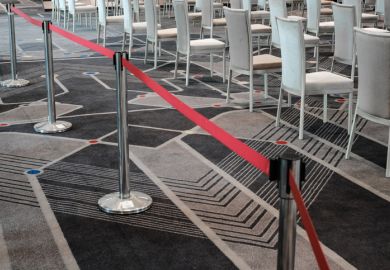Ben Marder’s lowest moment came two years into his first job in academia. On a dark day in 2015, he received his second rejection for a paper in the space of a week. Even then, Dr Marder was no stranger to rejection – it was his 15th in total – but this time the letter came from an editor considering his paper in a third round of review. The response was: “Please send us your best work in the future.”
“That was my best work,” said Dr Marder, now a senior lecturer in marketing at the University of Edinburgh Business School. “That evening, I consumed two bottles of red wine, a large pepperoni pizza and 20 Marlboro Reds [cigarettes] by myself while escaping into the BBC’s Don’t Tell the Bride.”
Almost every researcher knows the devastating feeling that can come from opening a letter with the words “We regret to inform you…”
But those in the throes of submitting and resubmitting a paper should remember that rejection rates at high-profile journals are notoriously high. Analysis by Frontiers, an open-access publisher, also suggested that even journals with impact factors below the average may reject as many as nine out of 10 papers.
Crucially, what doesn’t kill you will only make your work stronger, according to some who know “no” only too well.
Nigel Wright, deputy vice-chancellor, research and innovation, at Nottingham Trent University, suggests that rejection is less a mark of failure than it is of the correct level of determination.
“A 100 per cent success rate indicates that you need to aim higher,” said Professor Wright, who has published more than 120 papers over the course of his career. “Be ambitious in choosing a journal; if [your paper] is rejected, take the feedback on board and submit elsewhere.”
Of course, such practical measures can go only so far towards tempering the emotional blows. “Listen to Tubthumping by Chumbawamba – the drinking is optional,” he suggested.
Dr Marder said that his attitude towards rejection was now much healthier. “Rejection no doubt hurts at any stage of your career; but from my first-hand experience, for early career researchers [it] hurts more and is far more common,” he said. “Although nothing really dulls the heartache of a paper [being turned down]…speaking out about it [rejections] to colleagues really helps.”
One of his top tips for early career researchers is to collaborate with “fellow strugglers” – and, crucially, to not assume that working with senior scholars will be the ticket to publication success.
“A [senior] professor is very unlikely to help you complete and format references at 10:37pm on a Sunday,” Dr Marder said. “Working with fellow strugglers really…is great emotional support. You need someone [with whom you] can truly empathise, drown sorrows and swear at Reviewer 2.”
Dr Marder also advises that “when you see the rejection email, do not read the reviews straight away”. Instead, “close the email, grieve and return to the reviews a few days later”, he suggested. “Reading negative reviews straight after the blow of a rejection is just like rubbing salt into a wound.”
According to Mike Larkin, an emeritus professor of microbial biochemistry at Queen’s University Belfast, the same approach is also advisable when it comes to writing a response. It may be tempting to hit reply immediately and give an editor a piece of your mind, but it is important to “never react straight away to a letter or email”, he said.
“Put it away, sleep on it and look again the next morning,” suggested Professor Larkin, who is a former editor of the US journal Applied and Environmental Microbiology.
For Janet Ward, a digital marketing researcher at the University of Sunderland, rejection will never be something she is happy to receive, but it gets easier to handle with time. “Seeing rejection as part of the job helps,” as does “being realistic that this will happen”, she continued.
“I think everyone does feel [personally offended] by rejection, particularly early in their career,” she said. Dr Ward admitted that she has “sometimes challenged an editor” but that has rarely led to a successful outcome.
“Rejection…is never nice, but you learn to manage by having alternative strategies,” she concluded. “Nothing gets wasted. It’s the only mindset to have.”
POSTSCRIPT:
Print headline: No takers for your papers?
Register to continue
Why register?
- Registration is free and only takes a moment
- Once registered, you can read 3 articles a month
- Sign up for our newsletter
Subscribe
Or subscribe for unlimited access to:
- Unlimited access to news, views, insights & reviews
- Digital editions
- Digital access to THE’s university and college rankings analysis
Already registered or a current subscriber?








